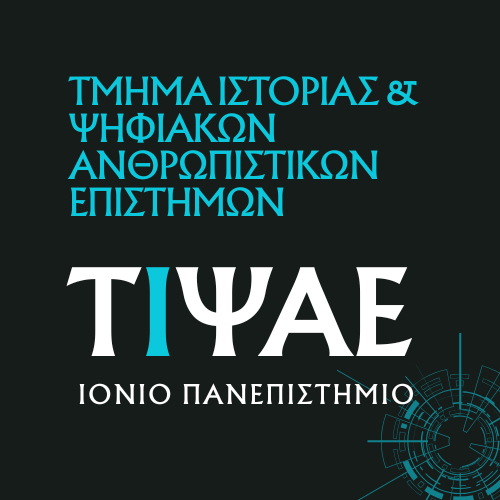SOCIETY AND IDENTITY IN THE U.S. OF AMERICA
Teaching Staff: Damilakou Maria
Course Code: ΙΑΜ608
Course Type: Seminar
Course Level: Undergraduate
Course Language: Greek
Delivery method: Lectures
Semester: 7th
ECTS: 5
Curricula: Curriculum in History up to 2024-25, Curriculum in History and Digital Humanities from 2025
The seminar discusses the US cultural landscape from the 17th century until today, as it is reflected in the American literature and cinema. It focuses on the main topics that across different periods shaped the American culture and identity, such as: The Puritan fantasy; the concept of the “American Dream” and the myth of “Manifest Destiny”; the West and the frontier in the American culture; slavery and the race question; society and identity of the American South; the Afro-American culture; the immigrant, his representations and national self-images; the American Dream in the 1920s and the crisis of the 1930s; interpretations of the post-WWII US global hegemony; prosperity, middle-class ideals and consumerism in the 1950s; perceptions of the “enemy” in the American society; the Counter-culture of the 1960s; the rise of ethnic identities.
Upon successful completion of the course, the students will have:
- Acquired basic knowledge about the characteristics and the dynamics of the American society,
- Understood the most important notions and myths that across different periods shaped the American culture,
- Become acquainted with major works (essays and novels) of the American literature,
- Got familiar with the interchange of ideas in the classroom and essay writing.
Week #1: Introductory lesson to the main topics of American culture and identity.
Week #2: The concepts “America” and “American” as formed since the beginning of European colonization. The Puritan fantasy and its impact on American culture.
Week #3: The concept of the “American Dream”. Perceptions of the American democracy from Jefferson to Alexis de Tocqueville.
Week #4: Slavery and Civil War. Slave Narrative.
Week #5: The myth of “Manifest Destiny” and the expansion to the West. The “frontier” in the American culture. Images of the West in the Western movies.
Week #6: The Indigenous Other: representations of Native Americans in US literature.
Week #7: The Afro-American culture in the South and North of US. The South- American societies. The Harlem Renaissance.
Week #8: The massive immigration to the US and the new perceptions of the national self (1890-1920).
Week #9: The American Dream in the Roaring Twenties. The Great Depression of the 1930s and its social impact.
Week #10: The American 50s: Prosperity, advertising industry boom, consumerism and middle-class ideals.
Week #11: Perceptions of the “enemy” in the American society: from McCarthyism to the contemporary “demons”.
Week #12: The Counter-culture of the 1960s.
Week #13: The rise of ethnic identities. The case of “chicano” (Mexican-american) identity.
General Bibliography: Paul Levine - Ντόρα Τσιμπούκη, Αμερικάνικες ταυτότητες. Η λογοτεχνική ιστορία των Ηνωμένων Πολιτειών 1603-2000, Αθήνα, Πατάκη, 2006. Samuel Huntington, Ποιοι είμαστε; Η αμερικάνικη ταυτότητα στην εποχή μας, Αθήνα, Λιβάνη, 2004. Γιώργος Θεοτοκάς, Δοκίμιο για την Αμερική, Αθήνα, Εστία, 2009.
The students will study passages of the following books (from Greek translation or from the original in the case of Erasmus students): Benjamin Franklin, Autobiography. Ralph Emerson, “Self-reliance”. Alexis de Tocqueville, Democracy in America. Nathaniel Hawthorn, The Scarlet Letter. Harriet Beecher Stowe, Uncle Tom´s Cabin. Harriet Jacobs, Incidents in the Life of a Slave Girl, James Fenimore Cooper, The Last of the Mohicans. F. Scott Fitzgerald, The Great Gatsby. John Steinbeck, The Grapes of Wrath. Walter Bernstein, Inside Out: A Memoir of the Blacklist. Beat poetry.
Analysis of texts (theoretical essays and literary works) that the students find in the e-class platform and prepare as homework. Class discussion of topics with the support of audiovisual material. Oral presentations of specific subjects by the students.
- E-class platform
- Use of audio-visual resources and materials
The evaluation is based on the short written essays that all students prepare on weekly basis and on the oral presentation of one specific subject chosen by each student.
Back



